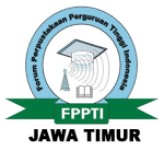Evaluation of High School Library Management
Implementation of CIPPO Evaluation Model
Downloads
Background of the study: Libraries as the heart of the life of science for the learning process need to be managed properly. Referring to standards adapted from school libraries such as the Regulation of the Head of the National Library of the Republic of Indonesia Number 12 of 2017 concerning National Standards for Senior High School / Madrasah Aliyah Libraries, will provide clear directions for its implementation.
Purpose: The purpose of this study is to determine the extent to which the application of the legal basis as a standard for organizing and managing high school libraries at the Yayasan BPI library.
Method: The research method used is a qualitative approach with an evaluative type of research. This study uses the CIPPO evaluation model in monitoring and evaluating the Yayasan BPI library.
Findings: In this study, it was found that the Yayasan BPI library had not fully met the standards as stated in the regulations. This happens because of the lack of human resources so that it is not effective and efficient in carrying out the work, services and programs designed by the school library.
Conclusion: The constraints felt by Yayasan BPI Library greatly affect the intensity of visitor visits. However, in fulfilling library materials, the Yayasan BPI library has fully met the information needs of its users.
Downloads
Akbar, A., Aplisalita, W. O. D., & Rusadi, L. O. (2021). Fungsi Perpustakaan Sekolah Terhadap Prestasi Belajar Siswa Sekolah Dasar. Edukatif : Jurnal Ilmu Pendidikan, 3(1), 203–212. https://doi.org/10.31004/edukatif.v3i1.286
Almas, A. F., & Machali, I. (2020). Implementasi Program Madrasah Tahfidz Kemenag DIY di Madrasah Aliyah Negeri Se-Kota Yogyakarta. Ta'dib, 23(2), 189. https://doi.org/10.31958/jt.v23i2.2071
Amiruddin, A., Robby, A. D., Efendi, I., Siregar, S. K., Rahman, M. Y., & Al-Adawiyah, R. (2022). Evaluasi Program Manajemen Perpustakaan di SMK Penerbangan PBD Medan Menggunakan Model CIPP. Jurnal Pendidikan Tambusai, 6(1), 83–89. https://www.jptam.org/index.php/jptam/article/view/2830%0Ahttps://www.jptam.org/index.php/jptam/article/download/2830/2416
Artana, I. K. (2019). Upaya mengoptimalkan peran perpustakaan sekolah melalui pengelolaan yang profesional. Acarya Pustaka: Jurnal Ilmiah Perpustakaan Dan Informasi, 6(1), 1–9.
Eskha, A. (2018). Peran Perpustakaan Sebagai Sumber Belajar. Jurnal Imam Bonjol: Kajian Ilmu Informasi Dan Perpustakaan, 2(1). https://doi.org/https://doi.org/10.15548/jib.v2i1.25
Fadhli, R., Bustari, M., Suharyadi, A., & Firdaus, F. M. (2021). Manajemen Perpustakaan Sekolah. CV. Pena Persada.
Fadli, M. R. (2021). Memahami desain metode penelitian kualitatif. Humanika, 21(1), 33–54. https://doi.org/10.21831/hum.v21i1.38075
Fatimah. (2018). Perpustakaan, manfaat, kelebihan dan kekurangan. Jurnal Imam Bonjol: Kajian Ilmu Informasi Dan Perpustakaan, 2(1). https://doi.org/https://doi.org/10.15548/jib.v2i1.27
Fauziah, S. N., Nur Faziah, S., Sulaehatun Nupus, F., & Ulfi, N. (2020). Evaluasi Minat Baca Siswa Melalui Program Literasi Sekolah. Jurnal Pendidikan Dan Ilmu Sosial, 2(1), 108–116. https://doi.org/https://doi.org/10.36088/nusantara.v2i1.641
Hayati, N. (2020). Evaluation of Mata Aksara Community Library program in increasing people's reading interest in Yogyakarta. 405(Iclles 2019), 135–138. https://doi.org/10.2991/assehr.k.200217.028
Kaharudin. (2018). Evaluasi program literasi sekolah pada Madrasah Tsanawiyah Binanga Negeri Kabupaten Mamuju. Educational Research and Evaluation, 53(9), 1689–1699.
Koswara, D. D. (2005). Implikasi Monitoring Dan Evaluasi Terhadap Peningkatan Mutu Sekolah. Jurnal Administrasi Pendidikan UPI, 3(1), 1–10. https://doi.org/https://doi.org/10.17509/jap.v3i1.6096
Muzayanah, U. M. I. (2021). Evaluasi program keterampilan evaluation of skills program in madrasah aliyah using CIPPO model pendidikan keterampilan selain pendidikan penyelenggaraan Madrasah Aliyah plus penyelenggara program keterampilan telah Jenderal Pendidikan Islam No. 4924 Tah. Jurnal Penamas, 32(2), 203–220. https://doi.org/https://doi.org/10.31330/penamas.v34i2.496
Parera, S. (2021). Evaluasi program Gerakan Literasi Sekolah di SD Kristen 03 Eben Haezer Salatiga [Universitas Kristen Satya Wacana]. https://repository.uksw.edu/handle/123456789/22460
Purnawirawan, O., Chintya, P. P., & Sholihah, M. (2020). The Application of CIPPO Evaluation Model in Evaluating the Performance of School for Producing Entrepreneurs Programs in Vocational High School. Advances in Social Science, Education and Humanities Research, 443, 387–391. https://doi.org/10.2991/assehr.k.200620.075
Sari, R. P., & Ahmad. (2020). Evaluasi Program Indonesia Pintar Di Madrasah Ibtidaiyah Swasta Kecamatan Blimbing Kota Malang Dengan Model CIPPO. Jurnal Evaluasi Dan Pembelajaran, 2(1). https://doi.org/https://doi.org/10.52647/jep.v2i1.10
Sinaga, D. (2011). Mengelola Perpustakaan Sekolah. Pustaka Putra Khatulistiwa.
Sintiawati, R., Wibawa, B., & Siregar, J. S. (2018). Evaluasi program kursus keterampilan di lembaga kursus pelatihan (lKP) Karya Jelita Kota Bandung, Jawa Barat (penerapan model evaluasi CIPPO). Jurnal Eksistensi Pendidikan Luar Sekolah (E-Plus), 3(2), 122–134. https://doi.org/http://dx.doi.org/10.30870/e-plus.v3i2.4891
Utami, N. R., Firdaus, E., Subakti, H., Purba, S., Salamun, S., Avicenna, A., Cecep, H., Cahyadin, W., Sakirman, S., Salim, N. A., Karwanto, K., & Tasrim, I. W. (2021). Supervisi Pendidikan. Yayasan Kita Menulis.
Wijayanti, N. I., Yulianti, R., & Wijaya, B. (2019). Evaluasi Program Pendidikan Pemakai Dengan Model CIPP di Perpustakaan Fakultas Teknik UGM. Tik Ilmeu : Jurnal Ilmu Perpustakaan Dan Informasi, 3(1), 37. https://doi.org/10.29240/tik.v3i1.790
Copyright (c) 2023 Anindya Putri Maharani, Angga Hadiapurwa

This work is licensed under a Creative Commons Attribution-ShareAlike 4.0 International License.
Record and Library Journal by Unair is licensed under a Creative Commons Attribution-ShareAlike 4.0 International License.
1. The journal allows the author to hold the copyright of the article without restrictions.
2. The journal allows the author(s) to retain publishing rights without restrictions
3. The legal formal aspect of journal publication accessibility refers to Creative Commons Attribution Share-Alike (CC BY-SA).
4. The Creative Commons Attribution Share-Alike (CC BY-SA) license allows re-distribution and re-use of a licensed work on the conditions that the creator is appropriately credited and that any derivative work is made available under "the same, similar or a compatible license”. Other than the conditions mentioned above, the editorial board is not responsible for copyright violation.


 57201398420
57201398420

























